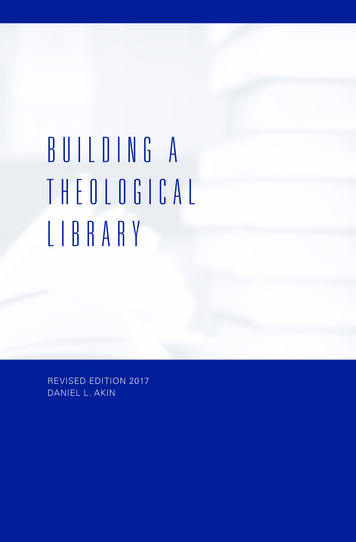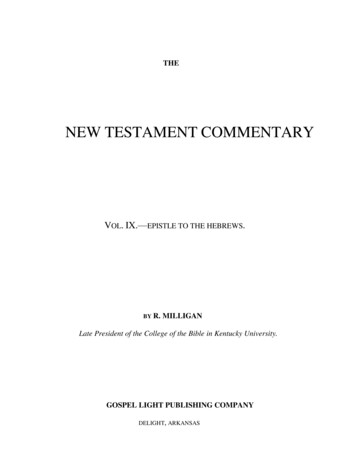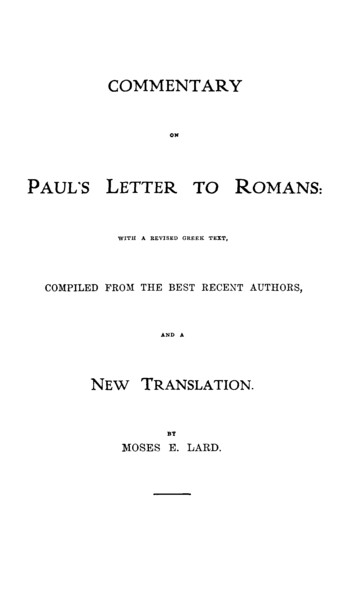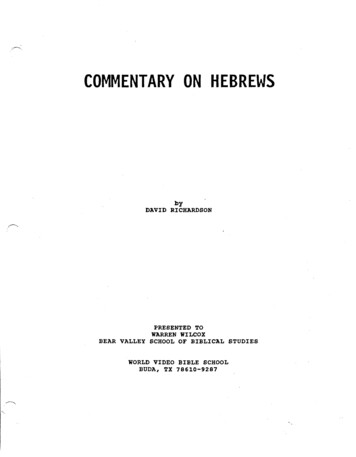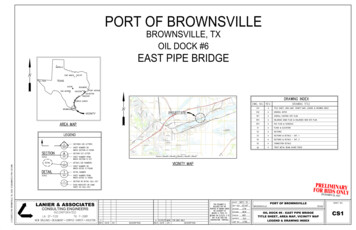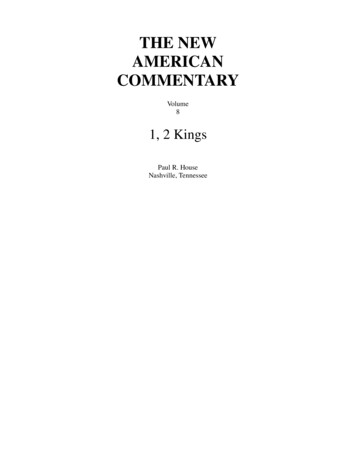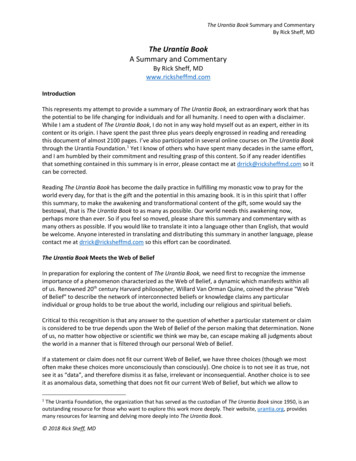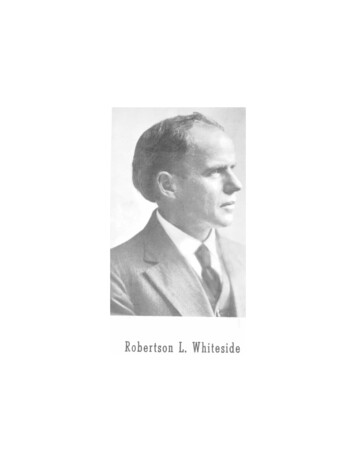
Transcription
A New Commentary OnPAUL'S LETTER TOTHE SAINTSAT ROMEBy Robertson L. Whiteside1945Fourth Edition, 1955Published by Miss Inys WhitesideDenton, Texas
First Edition, 1945Second Edition, 1948Third Edition, 1953Fourth Edition, 1955Copyright, 1945, byMiss Inys Whiteside, Denton, TexasManufactured byThe Manney CompanyFort Worth, Texas
INTRODUCTIONA noted scholar once remarked that the book of Romans was theprofoundest production in all literature. Shallow minds and superficialtreatment certainly cannot do justice to such an amazing and enduringdiscussion of redemption from sin as Paul has written in this famousepistle.R. L. Whiteside is superbly qualified to write a commentary on thebook of Romans. He has a rich background of age and experience. Hewas born in Tennessee, December 27th, 1869, where he attended thepublic schools, West Tennessee Christian College and the NashvilleBible School. He developed an ambition early in life to know and toteach the word of God. By nature he is modest and rather retiring, but histhirst for knowledge made him a close student, and his loyalty to truthmade him an independent thinker.From the beginning of his study of the Bible he has respected theconclusions of godly and experienced students of the Bible, though heearly realized that no man is infallible. He had to be sure of his ownground before he took issue with such men, he greatly admired theintellectual powers, the faith, and stalwart character, and humble bearingof that great man, David Lipscomb. To him David Lipscomb was theideal teacher, the ideal Christian, and yet on more than one occasion inBible classes in the Nashville Bible School, he took issue with theexpressed views of Brother Lipscomb. On more than one occasionBrother Lipscomb accepted the views of Brother Whiteside.
4COMMENTARY ON ROMANSBrother Whiteside has been a close student of the Bible all of hislife. His critical mind and power of reasoning have afforded him aninsight into the teaching of the Bible as a whole that few men have. Hisimplicit faith in God has led him to seek to know only what the will ofGod is, that he might comply with it and teach it without faltering. Thedegree of his success has left him a store of knowledge covering a widefield and eminently fitted him for producing an outstanding commentaryon the book of Romans.He successfully served as president of Abilene Christian Collegefor two years. He has ministered to some of the strongest congregationsas a preacher, spending five successive years with the church in Denton,Texas, where he has lived for many years. He has engaged in a numberof oral and written debates, was always confident and at ease and thecause of Christ prospered as a result of each discussion. His deportmenthas always been that of a gentleman in debate as on all occasions. For anumber of years he wrote the Annual Commentary on the Bible Schoollessons published by the Gospel Advocate. For some ten years he servedas Query Editor of the Gospel Advocate and was otherwise a regularcontributor to that paper. He is a veteran writer and widely recognized asa very able one.The commentary on the book of Romans is decidedly not justanother book. It is not a plagiaristic rehash of other books that have beenwritten. It is not the green product of a big hurry to write a book ordictate it to a stenographer. The book is a natural. It is a maturity that hasbeen in the process of growth for a long, long time. The author's years ofstudy of,
INTRODUCTION5and inspiring essays on the apostolic masterpiece have created awidespread demand for the book, a book that in a way just had to be. It ishere. It is a distinct contribution to Christian literature which will berecognized, not only by the church of which he is a member, but byothers also. It will find its place into the libraries of Bible students andteachers throughout the land. In some remarkable instances the authorhas broken new ground which will bring much satisfaction to the studentand open up a field of new thoughts. The literary style of the work ishighly gratifying. The reader does not have to dig through a lot ofsuperfluous verbiage to get at the thought. It is pointed right at your heartin a straight line. Here is a book you will want, get, and cherish.C. R. NicholCled E. WallaceFoy E. Wallace, Jr.
COMMENTARY ON ROMANSChapter 11 Paul, a servant of Jesus Christ, called to be an apostle, separated unto the gospel of God, 2which he promised afore through his prophets in the holy scriptures. 3 concerning his Son, who wasborn of the seed of David according to the flesh 4 who was declared to be the Son of God with power,according to the spirit of holiness, by the resurrection from the dead; even Jesus Christ our Lord, 5through whom we received grace and apostleship, unto obedience of faith among all the nations, forhis name's sake; 6 among whom are ye also, called to be Jesus Christ's: 7 to all that are in Rome,beloved of God, called to be saints; Grace to you and peace from God our Father and the Lord JesusChrist.8 First, I thank my God through Jesus Christ for yon all, that your faith is proclaimedthroughout the whole world. 9 For God is my witness, whom I serve in my spirit in the gospel of hisSon, how unceasingly I make mention of you, always in my prayers 10 making request, if by anymeans now at length I may be prospered by the will of God to come unto you. 11 For I long to seeyou, that I may impart unto you some spiritual gift, to the end ye may be established; 12 that is, that Iwith you may be comforted in you, each of us by the other's faith, both yours and mine. 13 And Iwould not have you ignorant, brethren, that oftentimes I purposed to come unto you (and was hinderedhitherto), that I might have some fruit in you also, even as in the rest of the Gentiles. 14 I am debtorboth to Greeks and to Barbarians, both to the wise and to the foolish. 15 So, as much as in me is, I amready to preach the gospel to you also that are in Rome.16 For I am not ashamed of the gospel: for it is the power of God unto salvation to every onethat believeth; to the Jew first, and also to the Greek. 17 For therein is revealed a righteousness of Godfrom1 faith unto faith: as it is written, But the righteous shall live by faith.18 For the wrath of God is revealed from heaven against all ungodliness and unrighteousnessof men, who hinder the truth in unrighteousness; 19 because that which is known of God is manifest inthem: for God manifested it unto them. 20 For the invisible things of him since the creation of theworld are clearly seen, being perceived through the things that are made, even his everlasting powerand divinity; that they may be without excuse: 21 because that, knowing God, they glorified him not asGod, neither gave thanks; but became vain in their reasonings, and their senseless heart was darkened.22 Professing themselves to be wise, they became fools 23 and changed the glory of the incorruptibleGod for the likeness of an image of corruptible man, and of birds, and four-footed beasts, and creepingthings.24 Wherefore God gave them up in the! lusts of their hearts unto nncleanness. that theirbodies should be dishonored among themselves: 25 for that they exchanged the truth of God for a lie,and worshipped and served the creature rather than the Creator, who is blessed for ever. Amen.26 For this cause God gave them up unto vile passions: for their women changed the naturaluse into that which is against nature: 27 and likewise also the men. leaving) the natural use of thewoman, burned in their lust one toward another, men with men working unseemliness, and receivingin themselves that recompense of their error which was due.28 And even as they refused to have God in their knowledge, God gave then up unto areprobate mind, to do those things which are not fitting; 29 being filled with all unrighteousness,wickedness, covetousness, maliciousness; full of envy, murder, strife, deceit, malignity: whisperers, 30backbiters, hateful to God, insolent.
CHAPTER 17haughty, boastful, inventors of evil things, disobedient to parents, 31 without understanding, covenantbreakers, without natural affection, unmerciful: 32 who, knowing the ordinance of God, that they thatpractise such things are worthy of death, not only do the same, but also consent with them that practisethem.Ver se 1: Paul , a ser vant of Jesus Chr i st , cal l ed t o be anapost l e, separ at ed unt o t he gospel of God. On t he phr ase, "Paul , aser vant of Jesus Chr i st ," James Mackni ght r emar ks: "The or i gi nal wor d'doul os' pr oper l y si gni f i es a sl ave. Her e i t i s a name of honor : f or i nt he East t he chi ef mi ni st er s of ki ngs wer e cal l ed 'doul oi ,' sl aves.Thi s honor abl e name, t her ef or e, denot es t he hi gh aut hor i t y whi ch Paulpossessed i n t he ki ngdomof Chr i st , as one of hi s chi ef mi ni st er s."I n t he phr ase, "cal l ed t o be an apost l e," t he wor ds "t o be" wer esuppl i ed by t he t r ansl at or s. They f r equent l y suppl i ed wor ds wi t h t hei nt ent i on of maki ng t he meani ng cl ear er t o t he Engl i sh r eader . Thesesuppl i ed wor ds ar e pr i nt ed i n i t al i cs. But i n t hi s pl ace t he suppl i edwor ds hi nder r at her t han hel p. The wor d t r ansl at ed "cal l ed" i s not aver b nor a par t i ci pl e, but a ver bal adj ect i ve. I t par t akes of t he nat ur eof a ver b and an adj ect i ve. The sense i s compl et e and cl ear , i f you r eadi t , "a cal l ed apost l e." Paul was not t el l i ng what he was cal l ed t o be,but what he was. Some Judai zi ng t eacher s char ged t hat he was not ar egul ar l y const i t ut ed apost l e, but t hat he had mer el y assumed t hatof f i ce, or had been appoi nt ed t o t hat of f i ce by t he chur ch at Ant i och.To meet t hat char ge, Paul asser t s t hat he was "a cal l ed apost l e"—anapost l e t hat had been cal l ed i nt o t hat of f i ce by Jesus Chr i st . He wassepar at ed f r om Judai sm and f r om al l ot her l i nes of act i vi t y, anddedi cat ed t o t he one busi ness of pr eachi ng t he gospel . Hi s own mot t owas i n har mony
8COMMENTARY ON ROMANSwith his calling—"This one thing I do." It was God's gospel, because itoriginated with him and came from him. It was in no sense a product ofman's theorizing or philosophizing. It was not a mere addition to the lawof Moses, as some Judaizers sought to make it. Paul did not preach hisconception of Christianity, but he preached the gospel as the Holy Spiritmoved him. He preached "a new and living way."Verse 2: Which he promised afore through his prophets in the holyscriptures. Why was Paul so particular to affirm that the gospel to whichhe had been separated and which he preached had been promised in theOld Testament Scriptures? He would have the Jews know that the veryscriptures on which they relied promised the gospel which he preached.In this letter, as well as in much of his other writings, Paul combated theprofessed Christians among the Jews who taught that the Gentileconverts had to be circumcised and had to keep the law of Moses, elsethey could not be saved. They were willing enough for Paul to makeconverts among the Gentiles, if he would have them circumcised andrequire them to keep the law; but because he would not do so, theseJudaizing teachers opposed him with all their might. They had drawn theidea that Gentiles could be saved only in subservience to all thingsJewish. But Paul taught that Jew and Gentile stood on an equal footingbefore God, and that the prophets had so foretold.Verses 8, 4: Concerning his Son, who was born of the seed ofDavid according to the flesh, who was declared to be the Son of Godwith power, according to the spirit of holiness, by the resurrection fromthe dead; even Jesus Christ our Lord. This connects back
CHAPTER 19with the end of verse 1. It was the gospel of God, but it was concerninghis Son. It is the gospel of God, because it originated with him; and it isalso the gospel of Christ, because it centers in him. Without Christ, therewould be no gospel. It is this gospel to which Paul had been separatedand which had been promised through the prophets in the holyScriptures. Yet some tell us that the prophets said nothing of the gospelas we have it revealed through the apostles. Such teachers occupy aposition similar to that occupied by the Judaizing teachers who sozealously opposed Paul.The contrast in verses 3 and 4 is between the human nature and thedivine nature of Jesus. As to his human nature, he was the son of David;as to his divine nature, he was the Son of God. By his genealogy he wasproved to be of the seed of David; but the final proof that he was the Sonof God was his resurrection from the dead. He had claimed to be the Sonof God and that he would arise from the dead the third day after hisdeath. The fact that he was raised as he said he would be, established thetruth that he was the Son of God. It is argued by some that theresurrection of the dead here referred to is the resurrection of all thedead, and that this universal resurrection was guaranteed by his ownresurrection. But that seems to miss the point. Whatever resurrection ishere referred to is used by Paul as proof to declare beyond doubt thetruth that Jesus is the Son of God. The resurrection of all the dead is yetfuture. How can a fact not yet accomplished be proof of anything? Butthe fact that Jesus did arise from the dead was the only, thing thatbrought absolute conviction to the hearts of even his disciples
10COMMENTARY ON ROMANSthat he was the Son of God. His resurrection from the dead left in theirminds no trace of doubt.Verse 5. Through whom we received grace and apostleship, untoobedience of faith among all the nations, for his name's sake. In the firstverse Paul declares that he was a called apostle; now he gives the sourceof that call. He had not forced himself into that high office, neither hadhe been called to it by men, but had received his apostleship direct fromthe Lord Jesus Christ. In that respect he was the equal of any otherapostle of the Lord. In another place he says of himself: "For I reckonthat I am not a whit behind the very chiefest apostles" (2 Cor. 11:5): "Forin nothing was I behind the very chiefest apostles" (2 Cor. 12:11)."Obedience of faith" is the obedience to which faith leads, and whichperfects faith. Paul had been made an apostle for the obedience of faithamong all nations—an agent of God to bring men to an obedient faith.Jesus said to him on the way to Damascus, "I am Jesus whom thoupersecutest. But arise, and stand upon thy feet: for to this end have Iappeared unto thee, to appoint thee a minister and a witness both of thethings wherein thou hast seen me, and of the things wherein I will appearunto thee; delivering thee from the people, and from the Gentiles, untowhom I send thee, to open their eyes, that they may turn from darknessto light and from the power of Satan unto God, that they may receiveremission of sins and an inheritance among them that are sanctified byfaith in me" (Acts 26:15-18). Paul preached much to Jews, but he wasespecially an apostle of the Gentiles. It is God's plan that Jew and Gentilehave equal rights to the blessings of the gospel.
CHAPTER 111Verses 6, 7: Among whom are ye also, called to be Jesus Christ's:to all that are in Rome, beloved of God, called to be saints: Grace to youand peace from God our Father and the Lord Jesus Christ. This letterwas not addressed to all the people of Rome, but to the called saints inRome—those who had been called by the gospel into the service ofChrist.Verse 8: First, I thank my God through Jesus Christ for you all,that your faith is proclaimed throughout the whole world. After theintroductory remarks in verses 1-7, and before entering into thediscussion of the problems of the letter, Paul seeks in verses 8-13 toestablish a sort of personal relationship with the Roman brethren. Thisgives the letter more of a personal touch. He wanted them to know thathe thanked God through Jesus Christ for them; he was thankful to Godthat their faith was so active that it was known and proclaimedthroughout the whole Roman Empire. A good church was a thing forwhich Paul was profoundly thankful to God, especially was he thankfulfor such a church in the capital city of the Roman Empire. Souls are asneedy and as valuable and a church might be as good, in an obscurelocality, as in a central city; but a church in a central city would be in aposition to exert an influence over a wider territory. A glance at Paul'slabors shows that he sought to establish churches in central places. Thesechurches then became radiating centers for spreading the gospel. AsRome was the capital city, and therefore the most important city in theEmpire, Paul was especially interested in having a strong and activechurch there.Verses 9,10: For God is my witness, whom I serve
12COMMENTARY ON ROMANSin my spirit in the gospel of his Son, how unceasingly I make mention ofyou, always in my prayers making request, if by any means now at lengthI may be prospered by the will of God to come unto you. "For God is mywitness" was a solemn declaration; he was not making the statementlightly. Perhaps some Judaizing teacher was at Rome and was trying todiscredit Paul by telling the brethren that Paul's oft-repeated promises tocome were never intended to be fulfilled. So Paul declares that God waswitness to the fact that always in his prayers for them he had requestedthat he might be permitted by the will of God to come to them. He wouldhave them know that, though he could make plans to come, hismovements were subject to God's will; and this should remind us that weshould not leave God out of our plans and purposes. On this point Jamessays: "Come now, ye that say, Today or tomorrow we will go into thiscity, and spend a year there, and trade, and get gain: whereas ye knownot what shall be on the morrow. What is your life? For ye are a vaporthat appeareth for a little time, and then vanisheth away. For that yeought to say, If the Lord will, we shall both live, and do this or that"(James 4:13-15)."Whom I serve in my spirit in the gospel of his Son." The spirit,the inner man, frequently called "the heart," is the source of our deeds ofacceptable service; and this service of the spirit, to be acceptable, mustbe in the gospel—that is, in the things the gospel requires. In John 4:24,Jesus says: "God is Spirit: and they that worship him must worship inspirit and truth." The spirit, the heart, must be in the worship, and theworship must be in the way truth marks out.
CHAPTER 113Verses 11, 12: For I long to see you, that I may impart unto yousome spiritual gift, to the end ye may be established: that is, that I withyou may be comforted in you, each of us by the other's faith, both yoursand mine. What was this "spiritual gift" which Paul desired to impart tothem? Commentators differ. Some tell us that it was the benefit Paulwished to impart to them by his teaching; but it can hardly be that, forPaul was teaching them in this letter. It seems more likely that hereferred to spiritual gifts, though it is singular that he said "gift" insteadof "gifts." Perhaps there were not as many people in that church endowedwith miraculous powers as Paul thought there should be. It is likely thatsome of the active workers among Paul's friends had received thesepowers before they went to Rome. One thing is sure; and that is, thatsome people at Rome had been endowed with these spiritual gifts, forPaul gave instructions about the proper use of them. (See Rom. 12:6-8).Paul wanted to impart this spiritual gift, "to the end ye may beestablished." He wanted both himself and them to be comforted in eachother's faith. To confer upon them some spiritual gift would certainly bea comfort to them, and to see their increase of faith and usefulness wouldbe a comfort to him.Verse 13: And I would not have you ignorant, brethren, thatoftentimes I purposed to come unto you (and was hindered hitherto), thatI might have some fruit in you also, even as in the rest of the Gentiles. Hehad been hindered from carrying out his plans to visit them. This showsthat he was not guided by inspiration in forming his plans, for the HolySpirit would not guide him in forming plans and then allow
14COMMENTARY ON ROMANShim to be hindered from carrying out his plans. Paul did sometimes formhis own plans, or purposes, which the Holy Spirit did not allow him tocarry out. When the Lord was directing Paul toward European fields oflabor, he wanted to turn aside and preach in Asia, but was forbidden ofthe Holy Spirit to do so. Then he wanted to go into Bithynia, and theSpirit suffered him not to do so (Acts 16:6-8).Verses 14, 15: I am debtor both to Greeks and to Barbarians, bothto the wise and to the foolish. So, as much as in me is, I am ready topreach the gospel to you also that are in Rome. It was not anything theseGreeks and Barbarians had done for Paul that put him in debt to them.Jesus had redeemed him, saved him, and made him an heir of heaven,and thus had brought him under obligation to do all he could to carry thesame blessings to others. He had thus been brought under obligation toall men. He was ready to do what he could to discharge that obligation tothe Romans.A practical question arises here: Was Paul under any obligationthat the rest of us are not under? Are we not in debt the same as he? Arenot all Christians under the same obligations? Every one is responsibleup to the limit of his possibilities.Verse 16: For I am not ashamed of the gospel: for it is the powerof God unto salvation to every one that believeth; to the Jew first, andalso to the Greek. For preaching the gospel Paul had been subjected tomany indignities and had endured much suffering. His own nation hadcast him off. He had been cast out of Antioch of Pisidia, stoned at Lystra,beaten and imprisoned at Philippi and had fled from Thessalonica toavoid his enemies; he had been mocked by the philo-
CHAPTER 115sophers at Athens, persecuted at Corinth, and a great mob at Ephesus hadsought to do him harm. He had suffered all this, and much more; and yethe was not ashamed to preach the gospel "even at Rome; where riches,pomp, and glory are alone held in admiration, where the heights ofgenius and learning are united with the greatest profligacy of manners;and where, consequently, the humbling doctrines of a religion whichdemands severe self-denial would be likely to attract derision, and mightmake the preacher and professor of it as it were ashamed."But why should anyone be ashamed of the gospel? It has God asits source, Jesus Christ and his plan of salvation its subject matter, theHoly Spirit as its Revelator, the highest ideals as its philosophy of life,and heaven as its ultimate goal. To be ashamed of the gospel is to beashamed of God, of Christ, and of the Holy Spirit. Should a person beashamed to be a child of the ruler of the universe, ashamed of being acitizen of the glorious kingdom of Christ, ashamed to be striving forheaven and immortal glory? Yet some people are ashamed of the gospel;but not so Paul. No sane person, when he considers, will be ashamed ofthat which brings the greatest possible good to his fellows. He may havemany reasons for being ashamed of himself, but not one reason for beingashamed of God.Paul tells why he was not ashamed of the gospel; and, in givingthe reason for his not being ashamed of the gospel, he announces thetheme of his letter. He does not abruptly announce his theme, but leadsup to it in an informal way. He spoke of his long-cherished desire topreach the gospel in Rome, that he was a debtor to all, and that to theextent of his ability he was
16COMMENTARY ON ROMANSready to preach the gospel in Rome, for he was not ashamed of thegospel; and then he announced the real theme of his letter: "For it is thepower of God unto salvation to every one that believeth." But what is theforce of that expression?Bloomfield says: "The sense is, 'For it is the powerful meansappointed by God for the salvation of all who believe and embrace it.'Thus the sentence comprehends two assertions: (1) of the completeefficacy of the gospel to salvation; (2) that the extent of this efficacyshall reach unto all who believe and obey it, without distinction of Jew orGentile; i.e., as far as concerns the gracious design of God, it shall beuniversal." A note in the Cambridge Greek Testament: "Tr. 'God's powerfor salvation' closely together— equals God's effective means for savingmen. The insertion of the article in A. V. and R. V. only weakens theforce of the expression."Preachers have lessened the force of the expression byemphasizing "the"; as a matter of fact, "the" is not in the original. Thegospel is God's power for saving men. God's power has been, and is,manifested in many ways for many purposes. In creating the world, heused his creative power; in saving men he uses his saving power. Thepower by which God saves men is his gospel. If men are saved, they willbe saved by God's power. Paul was not ashamed of the gospel for it isGod's power for salvation.But many religious people do not believe that the gospel is God'spower for saving men. Their whole theory of conversion is built on thetheory that man is so depraved by nature that he cannot so much asbelieve the gospel until he is first regenerated, or made
CHAPTER 117alive, by a direct work of the Spirit. That doctrine is set forth in theircreeds. With all such religionists, the direct work of the Spirit is thepower which saves. Many have been the prayers for God to "send theconverting power down and save these sinners now." The mourners'bench system was the way that theory was carried into practice a fewyears ago. They have dropped that practice, but still hold to the theory onwhich it was based. It seems, therefore, that it used to take more praying,singing, and shouting to induce God to send down converting power thanit does now! It would be useless to ask any of these fellows to explainwhy this is so, for they cannot explain it. Neither can they make theirtheory harmonize with Paul's plain declaration that the gospel is God'spower for salvation.The gospel was made to meet the sinner's needs as he is, and it waspreached to him by inspired men as a being responsible for the way hetreated their message. In the great commission Jesus gave not one hintthat sinners could not obey the gospel, and not one time did any inspiredman tell his auditors that they must have a direct work of the Spirit toenable them to do what they were commanded to do. That wasChristianity in practice. And the practice of inspired men is worth morethan all the theories of all the creeds. It is both interesting and instructiveto follow the inspired preachers and see how they proceeded.When Peter preached to the multitudes on the day of Pentecost, heexpected them to hear and understand what he said. He sought to driveconviction to their hearts, depending alone upon his arguments. Hesucceeded in doing so, for the record says: "Now when
18COMMENTARY ON ROMANSthey had heard this, they were pricked in their heart, and said unto Peterand the rest of the apostles, Brethren, what shall we do?" They were notso dead but they could hear and understand; not so depraved but thatthey could feel the force of Peter's arguments, and desire to get rid oftheir guilt. The Holy Spirit, knowing that they did not need that directenabling power from above, told them plainly what to do: "Repent ye,and be baptized every one of you in the name of Jesus Christ unto theremission of your sins; and ye shall receive the gift of the Holy Spirit.""And with many other words he testified, and exhorted them saying, saveyourselves from this crooked generation." Of course, the only way theycould save themselves was to turn from their sins in obeying the gospel.It is certain that they had not been saved up to the time Peter exhortedthem to save themselves. And it is just as evident that they could do whatthey were commanded and exhorted to do. Not one word is said abouttheir being so depraved that they could not do anything; nothing was saidas to their need of a direct power to enable them to appropriate thebenefits of the gospel. The gospel was adapted to them as they were. No;God did not make a plan to save folks, and then have to save the folksbefore the plan would operate on them!Verse 17: For therein is revealed a righteousness of God fromfaith unto faith: as it is written 'But the righteous shall live by faith.' Theseventeenth verse has given a good deal of trouble to commentators.They have not so much trouble in determining the meaning of the wordsas in determining the proper place of the two prepositional phrasesnamely, "from faith" and
CHAPTER 119"unto faith." Translators and commentators differ as to the proper placingof these phrases. Some would have the phrase "from faith" to modify theword "revealed." But to say that the gospel was revealed from faith is, tome, meaningless. I can see how the revealed gospel might produce faith,but cannot see how faith could produce the gospel. And to say, as somewould have it, that the gospel was revealed from one degree of faith toanother is equally meaningless. The gospel was not revealed by faith, butby inspiration. If we take into consideration Paul's reason for making thestatement, together with a correct conception of the plan of salvation, weshould not have much difficulty in arriving at a proper understanding ofthe verse. Notice carefully this clear statement by James Macknight:"'The righteousness of God revealed from faith to faith' is an assembly ofwords to which no distinct meaning can be attached. But the original,rightly construed, gives the following clear literal sense: 'Therighteousness of God by faith is revealed in it, in order to faith.' Theapostle was not ashamed of the gospel, because a righteousne
The commentary on the book of Romans is decidedly not just another book. It is not a plagiaristic rehash of other books that have been written. It is not the green product of a big hurry to write a book or dictate it to a stenographer. The book is a natural. It is a maturity that
